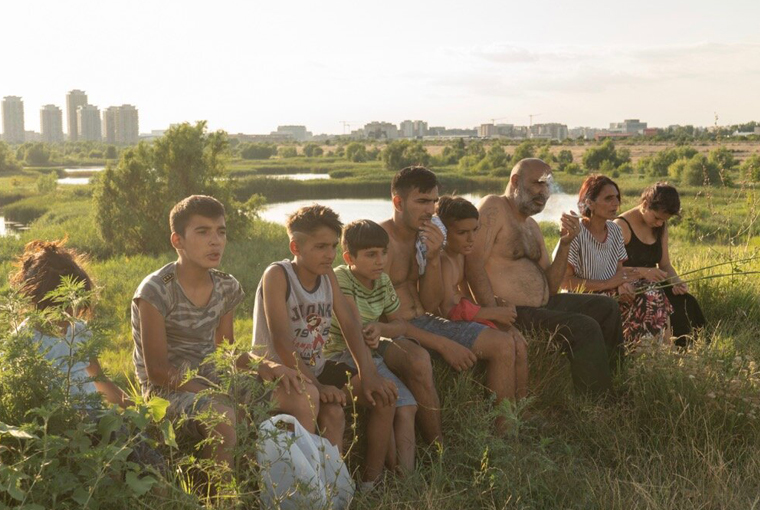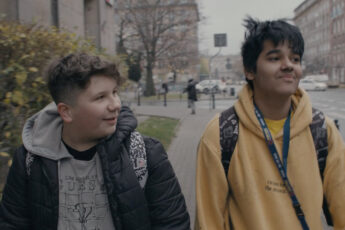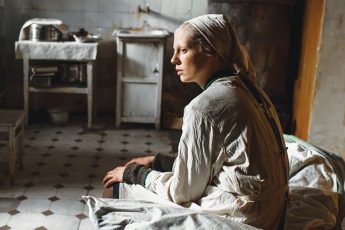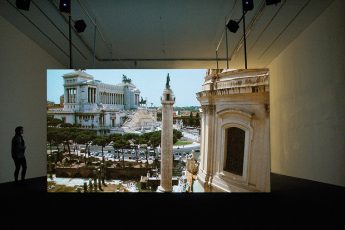
Communal life outside of society is often associated with a specific ideological alignment. In Germany, where such communities have grown out of the 60s, they are usually anti-capitalist and environmentally conscious; recently, some Nazi “Kommunen” have sprung up as well. In each of these cases, living outside the bounds of society (or rather at its fringes) is a voluntary act by a group of people driven by political opposition to the status quo. In the former case, the driving force is an awareness of the destructive and environmentally disastrous effects of free-market economies. In the latter case, the inhabitants – while sometimes sharing anti-capitalist and to a lesser extent ecological intuitions – strive towards a society dominated by racism and self-isolation (allegedly a state we have yet to reach).
An altogether different type of post-societal community is at the center of Radu Ciorniciuc’s documentary. A community of 11 – mother, father, and their 9 children – live in the wetlands of Lake Văcărești. Though the swampy area is part of Bucharest, it has grown into a space of near-wilderness following decades of abandonment. Here the Roma family scavenge for food, shelter in a self-built shack, and spend their summers among fields of golden reed. While the family – certainly the father – disdains society’s ways, their goal is not utopian or communally embedded like that of the communes, but simply a matter of survival. Between life in the meek moorland and the city, where the state exerts its unforgiving hand, racism abounds, and the teenage boys are lured by alcohol and gambling, nature seems like the lesser evil. But with no formal mandate to stay in the wetlands, the party of pariahs live in a state of legal limbo and are ultimately chased out of their home as the area around it is declared a nature park.
Acasa opens with a sequence showing several of the children enjoying themselves during a hot summer day. Though their playful routine is interspersed by chores – they are briefly shown fishing, and refilling a water tank –, it is a depiction of those carefree moments many of us associate with childhood. The siblings swim, brawl, and wander; they tease and bad-mouth each other. The first time we meet their father, he is seen lying in the grass with his calm posture and docile smile. The mother washes clothes in a green plastic tub. It is here that we are first shown how scarce the means of the family really are – they live in a small hut that is surrounded by garbage and covered with pitted blankets –, but the film does not suggest that this is a state of misery. If pigeons, cats, pigs and dogs come in and out of the house, it is because they have been welcomed as members of the community, each fulfilling their own role in this improvised arrangement. This community may be unusual, but it is functional in perpetuating the subsistence of its members.
What threatens the idyll is not the modest makeup of the scenery, then, but an intrusion from the outside world. Gică, the father, receives a phone call early into the documentary announcing an impending visit from the social services. His children, who don’t go to school, could be taken away from him, and so they hide in the reed. This cat-and-mouse game will evolve with repeated visits from social service representatives, policemen, politicians, and bureaucrats, which will provoke ever greater threats from Gică. (At one point, he will threaten to self-immolate, positioning himself next to a power generator with a burning cigarette in his hands.) The permanent presence of the camera during the dangerous conflict with the state is just one problem to be reckoned with. That Gică’s interactions with politicians, some of which are not favorable to him, are simply observationally documented is another weakness of the film. It is not acknowledged that politicians are media-trained professionals whose argumentative superiority in some of the exchanges may simply be a function of rhetoric.
Eventually, the family is chased out of the reservoir. They move into an apartment where the landlady tells them that she is not racist and that the Roma family can move in as long as they leave everything as it is. But after the move to the city, nothing seems to stay the same. The children enter school, but they are also subjected to abuse by neighbors and the police, who hit one of the boys when they are caught fishing in the city. Meanwhile, the social services want the family to move to a place that Gică fears will be a “ghetto”. Soon, several of the family members will begin pining for the old times when things were better. Having found a girlfriend and growing sick of Gică’s authoritarianism, eldest son Vali moves out of the crammed appartment.
Radu Ciorniciuc and screenwriter Lina Vdovîi tell the story of a paradise lost. If the film does acknowledge positive changes to the family’s move to the city – the children’s schooling, and the challenge to Gică’s patriarchal authority, it also dwells in some of the family members’ pining over life in the wilderness. And so the conflict becomes one of state authority versus individual life choices. By depicting Gică’s exchanges with state representatives, contrasting life inside and outside of society, and showing the alienation and hardships resulting from the move, the film invites us to ask if the state’s goal and means of relocating the family were legitimate. Is one free to make one’s own life choices and live wherever one wants, or can the state exert its authority based on the children’s lack of schooling (and means) and the natural preservation of the wetlands?
That is a legitimate question in relation to communes. But the title-lending home of the Roma family is not a commune. The deeper-lying question the documentary fails to raise is where the family’s individual life choices derived from in the first place. Even from watching the film, it should be clear that the alternative to life in the wetlands is rife with pitfalls. And the director has revealed during a Q&A that Gică served time in prison before relocating his family to the moorland.1 What would life for a Roma ex-convict and his family have looked like in the city? What would social housing and state support be like? Would Gică’s fears of life in the “ghetto” prove to be justified? What is clear is that the conditions for the family’s move to their wildlife shelter could not be more different to those of most members of modern communes. The home the family were evicted from was likely itself a refuge. It was most certainly not an alternative to life in a protected environment.
The film does well in making the viewer critically reflect on forced evictions. But focusing on the quotidian struggles related to this threat may keep the viewer from noticing the underlying reality. The family’s story does not begin with their eviction, but with their preferring a life in utter destitution over whatever they faced in the city. Remember how the series of violent evictions of makeshift refugee camps in and around Paris last year caused an uproar, and rightly so? What about the scandal of countless people having to live in a tent in the first place? We pay attention to the tent’s eviction, but not to the conditions of its daily erection and permanent use. Thus with Gică and his family.
References
- 1.Q&A during DOK.fest München @home 2020. https://www.youtube.com/watch?v=VuRUsZrZ1LU [accessed on January 29th 2021.].




Leave a Comment